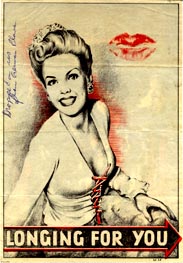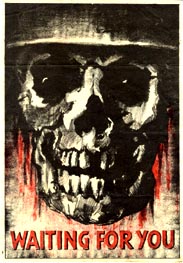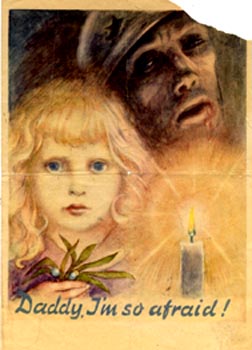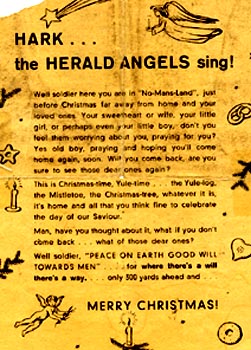|
 are acknowledged, affirmed and commemorated.
|
Posted on 12/22/2002 12:03:28 AM PST by SAMWolf
|
 are acknowledged, affirmed and commemorated.
|

| Our Mission: The FReeper Foxhole is dedicated to Veterans of our Nation's military forces and to others who are affected in their relationships with Veterans. We hope to provide an ongoing source of information about issues and problems that are specific to Veterans and resources that are available to Veterans and their families. In the FReeper Foxhole, Veterans or their family members should feel free to address their specific circumstances or whatever issues concern them in an atmosphere of peace, understanding, brotherhood and support.
|
|
|
|
On December 16, 1944, the Germans launched their largest offensive of the war on the Western Front. The primary goals of the offensive were to capture the Belgian port of Antwerp and to drive a wedge between the British and American armies. This offensive is often referred to as the "Battle of the Bulge." It's failure was due largely to American resistance around St. Vith, on the northern shoulder of the Bulge, and by American forces holding Bastogne on the southern shoulder of the Bulge. The town of Bastogne is strategically located at the center of the road network of the Ardennes. The Germans referred to it as a "road octopus" since the majority of roads in that region of the Ardennes pass through the town. The town's strategic location made it vitally important to the outcome of the offensive. The Allies realized its importance and General Eisenhower dispatched the 101st Airborne Division to hold the town at all costs. This victory resulted in the first full Army Division Presidential Distinguished Unit Citation. This interview focuses on the story surrounding the German's request for the American forces at Bastogne to surrender and the American General's response as witnessed by Lt. General Harry Kinnard, at the time of the siege of Bastogne, a Lt. Col. and Division G-3. These are some of his personal recollections.  We got into Bastogne late on the night of 18 December, 1944. We were not well equipped, having just gotten out of combat in Holland. We were particularly short of winter clothing and footwear. On the 21st of December we became completely surrounded by Germans and our field hospital was overrun by a German attack. We had put the hospital in what would normally have been a safe place, but no place is safe when you are completely surrounded. At this time, we were not able to receive air resupply because the weather was absolutely frightful. It was very, very cold and snowy. Visibility was often measured in yards. Our lack of winter gear was partially offset by the citizens of Bastogne who gave us blankets and white linens that we used for camouflage. While we were still surrounded, on the morning of December 22, a German surrender party, consisting of two officers and two NCOs, and carrying a white flag, approached our perimeter in the area of our Glider Regiment, the 327th. The party was taken to a nearby platoon command post. While the enlisted men were detained the officers were blind folded and taken to the command post of the 327th where they presented their surrender ultimatum. The ultimatum in essence said the 101st's position was hopeless and that if we elected not to surrender a lot of bad things would happen.  The message was brought in to the Division Headquarters by Major Alvin Jones, the S-3, and Colonel Harper, the Regimental Commander. They brought the message to me, the G-3 and Paul Danahy, the G-2. My first reaction was that this was a German ruse, designed to get our men out of their fox holes. But be that as it might, we agreed that we needed to take the message up the line. We took it first to the acting Chief of Staff of the Division, Lt. Col. Ned Moore. With him, we took the message to the acting Division Commander General Tony McAuliffe. Moore told General McAuliffe that we had a German surrender ultimatum. The General's first reaction was that the Germans wanted to surrender to us. Col. Moore quickly disabused him of that notion and explained that the German's demanded our surrender. When McAuliffe heard that he laughed and said: "Us surrender? Aw, nuts!" the date was December 22nd, 1944 The fortune of war is changing. This time the U.S.A. forces in and near Bastogne have been encircled by strong German armored units. More German armored units have crossed the river Our near Ortheuville, have taken Marche and reached St. Hubert by passing through Hompre-Sibret-Tillet. Libramont is in German hands. There is only one possibility to save the encircled U.S.A. troops from total annihilation: that is the honorable surrender of the encircled town. In order to think it over a term of two hours will be granted beginning with the presentation of this note. If this proposal should be rejected one German Artillery Corps and six heavy A. A. Battalions are ready to annihilate the U.S.A. troops in and near Bastogne. The order for firing will be given immediately after this two hours' term. All the serious civilian losses caused by this artillery fire would not correspond with the well known American humanity. The German Commander. But then McAuliffe realized that some sort of reply was in order. He pondered for a few minutes and then told the staff, "Well I don't know what to tell them." He then asked the staff what they thought, and I spoke up, saying, "That first remark of yours would be hard to beat." McAuliffe said, "What do you mean?" I answered, "Sir, you said 'Nuts'." All members of the staff enthusiastically agreed, and McAuliffe decided to send that one word, "Nuts!" back to the Germans. McAuliffe then wrote down: "Nuts!" The American Commander." McAuliffe then asked Col. Harper to deliver the message to the Germans. Harper took the typed message back to the company command post where the two German officers were detained. Harper then told the Germans that he had the American commanders reply. The German captain then asked, "Is it written or verbal?" Harper responded that it was written and added, "I will place it in your hand." The German major then asked, "Is the reply negative or affirmative? If it is the latter I will negotiate further."  At this time the Germans were acting in an arrogant and patronizing manner and Harper, who was starting to lose his temper, responded, "The reply is decidedly not affirmative." He then added that, "If you continue your foolish attack your losses will be tremendous." Harper then put the German officers in a jeep and took them back to where the German enlisted men were detained. He then said to the German captain, "If you don't know what 'Nuts' means, in plain English it is the same as 'Go to Hell'. And I'll tell you something else, if you continue to attack we will kill every goddam German that tries to break into this city." The German major and captain saluted very stiffly. The captain said, "We will kill many Americans. This is war." Harper then responded, "On your way Bud," he then said, "and good luck to you." Harper later told me he always regretted wishing them good luck.
|

Robert M. Bowen
C Company
401st Glider lnfantry
101st Airborne Division
GLOOMY CHRISTMAS
December 24 and 25, 1944, were for me two of the worse days of my life. The 101st Airborne Division had been surrounded at Bastogne, Belgium since the night of the 20th, was short of ammunition and supplies, had its hospital captured, and was in danger of being overrun. I was an NCO rifle platoon leader in Company C, 401 GIR and my company was manning roadblocks on the western perimeter of the encircled city near Flamierge. We had repulsed attacks in our sector on the 19th, 20th and 22nd. On the 23rd the Germans came again early in the morning out of a heavy fog which hung over the bitter cold, snow covered hills wearing snowsuits and with tanks painted white.
They were from the 77th Regiment of the 26th Volksgrenadier Division, 14 tanks with infantry. Although the roadblock had a Sherman, a TD, a half-track and a 37mm antitank gun, a combination of misfortunes prevented their being much use. The Sherman was knocked out in the first burst of shelling, the antitank gun was frozen in the ground and couldn't be traversed to fire on the enemy armor and the crew of the half-track vanished. There was little support from division artillery because of an ammunition shortage, but our 88 mm mortars were a big help.
The division history devoted two short paragraphs to the action, making it sound no more than a patrol incident: nothing about the desperation, hopelessness and drama of the men who fought and died there that day. I was wounded about 1600 [4:00 PM] and put in a basement of a house just behind the MLR where the medics had set up an aid station. The roadblock fell just after dark. All the wounded and medics, the crews of the armor and a few men from Company C were captured, all that remained of the reinforced platoon that held the position. The prisoners were thoroughly searched, threatened with death, and finally marched to trucks which took them into St. Hubert for interrogation. When that was over they were put in the attic of a nearby house under the guard of young gefreiters with itchy trigger fingers.
We were hustled out of the house early the next morning to a captured American weapons carrier with an attached trailer. A biting wind blew over the chilling snow, piercing our inadequate clothing like a knife. We were hungry, cold, and depressed: hungry because we had been living off of one or two K rations a day for nearly a week: cold because many of us did not have overcoats, overshoes, gloves or mufflers: and depressed because after fighting debilitating campaigns in Normandy and Holland with their high casualty rates, this one in Belgium threatened to be the last straw to push us over the edge.
Men such as this are able to overcome any fear that they may have. It is called courage, and can rub off on others.




Disclaimer: Opinions posted on Free Republic are those of the individual posters and do not necessarily represent the opinion of Free Republic or its management. All materials posted herein are protected by copyright law and the exemption for fair use of copyrighted works.